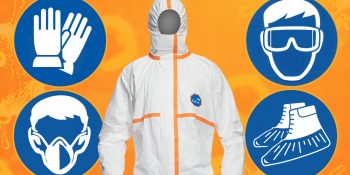A half-dozen volunteers outside of CU Boulder’s Environmental Health & Safety (EHS) building began piling a mountain of boxes into two pickup trucks and a moving truck Friday afternoon.
The load: a whole lot of help from nearly 40 campus units.
Across the country, health care professionals have pleaded for necessary supplies to respond to a pandemic that’s far outstripping their resources. The shortfall of so-called personal protective equipment (PPE) has left those workers in danger of becoming ill from COVID-19 as they treat patients. A lack of testing or vaccine has resulted in a virtual shut down of communities in an effort to flatten the curve, or slow the spread of coronavirus as it spreads around the globe.
CU Boulder joined an array of relief and supply efforts last week with a donation of more than 130,000 pieces of PPE. Dozens of departments, units and labs across campus donated gloves, N-95 masks, face shields, shoe covers and other PPE.
The donation went to the Boulder Office of Emergency Management (OEM), which will distribute the supplies to health care providers, long-term care facilities and first responders throughout the county.
“These donations far exceeded my expectations,” said Garry DeJong, director of campus emergency management. “Coupled with our researchers and engineers working on ways to keep people safe and finding ways to fight COVID-19, CU Boulder is making a sizable impact in this historic moment.”
PPE is regularly used throughout CU Boulder’s campus for research and other purposes from chemical labs to University Libraries.
DeJong led the charge alongside EHS Director Brandon Boger. Their teams worked for weeks soliciting donations across campus and creating an inventory. The donations equate to roughly 98% of the campus’ PPE. The remainder is being reserved for campus health care providers and essential workers. In alignment with Centers for Disease Control guidance, workers whose job duties do not require an N-95 mask are encouraged to wear homemade cloth masks.
“We were hoping for five to ten departments to donate a few items,” said DeJong.
“Once the word got out about the donations drive, the CU partners just continually kept stepping up.”
Mike Chard, director of the Boulder Office of Emergency Management, said he was extremely grateful.
“The COVID-19 pandemic has created tremendous pressure on our health care systems, long-term care facilities and first responders,” Chard said. “Being able to keep the supply of medical and PPE at an essential service level preserves health care and government services and protects staff.”
Margie Hunter, assistant to the director of EHS, was involved in coordinating and documenting the campus donations. Hunter and a small group of coworkers watched as emails rolled in from departments around campus looking to put their PPE to good use.
“I think we all want to step up when a crisis occurs, but don’t always know what to do to help,” Hunter said. “I feel that this process gave each of us that measure of satisfaction and gratitude that we were doing something that would make a difference for those first responders and the medical personnel who are facing this thing firsthand.”
Broader efforts
Other faculty, staff and students have jumped into the fight as well.
Engineering faculty and students are 3D-printing key parts of protective face shields.
Daniel Larremore, an assistant professor in the Department of Computer Science and in the BioFrontiers Institute, is using Facebook data to track the virus’ spread, and perhaps predict where it could go in the coming weeks.
The BioFrontiers Institute, the College of Engineering & Applied Science, the Sustainability, Energy & Environment Lab (SEEL) and other campus units also worked in the early stages of the pandemic to get respirators, sterilization ovens and other PPE to Boulder County Health officials.
Community needs
For students, faculty, staff and friends of CU Boulder looking to donate or give back to the community, you can find more via the new Buffs Together initiative.
The state is organizing giving and volunteer opportunities through Help Colorado Now.
SPREAD THE NEWS
COMMENT, Like, Follow & SHARE @I70Scout
CURRENT EDITION
WEATHER & TRAFFIC PUZZLES RECENT NEWS ADVERTISE WITH US
